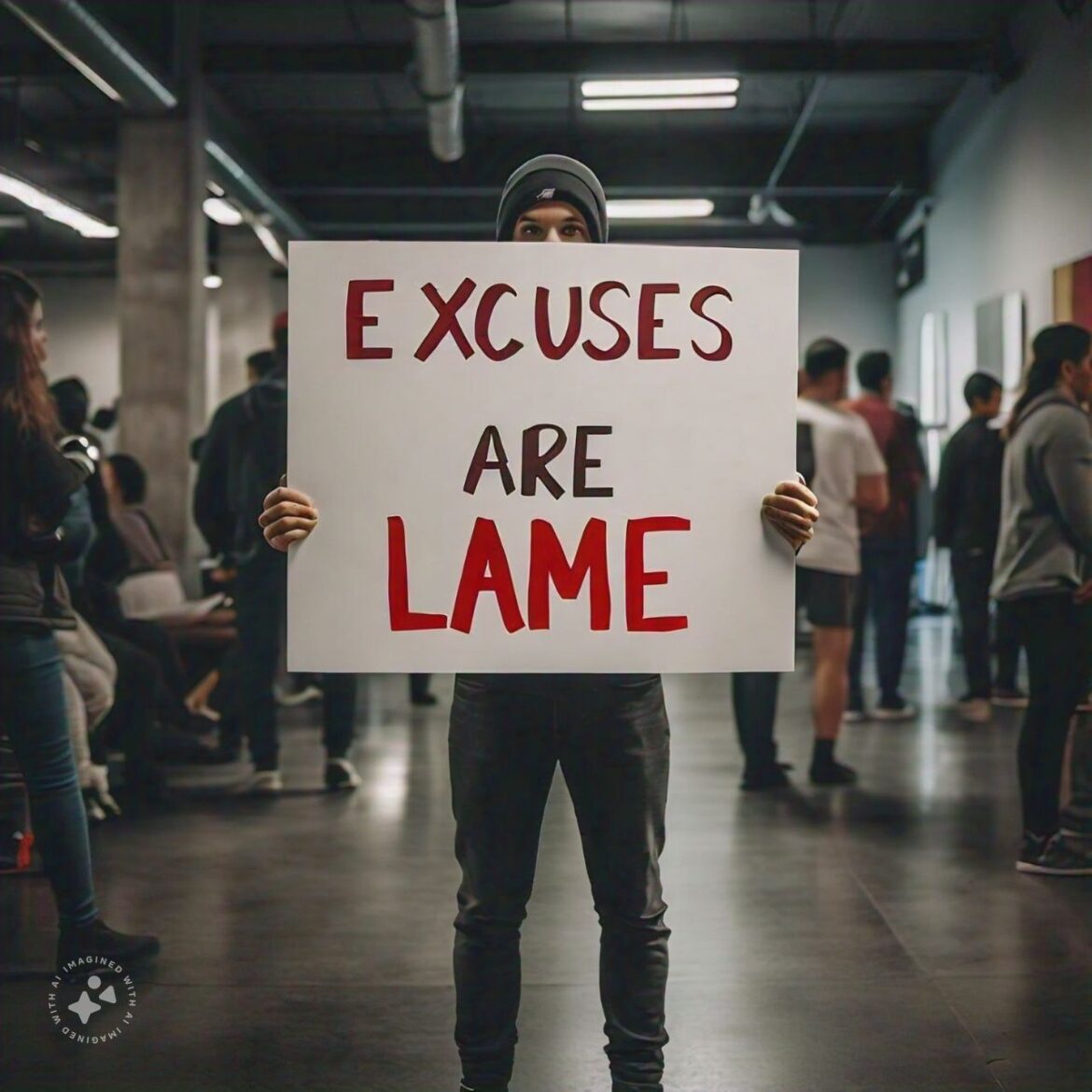Have you ever thought about why we make excuses instead of owning up to our actions? It’s a habit many of us do without realizing it. We turn to excuses when we should face our own flaws. Excuses are lame, but do we really see how they affect our self-improvement and growth? Let’s explore the world of excuses and see how they might be stopping you from reaching your goals.
No one likes being called out, but the truth is, that excuses help us dodge blame or lessen our guilt. Studies show that in social settings like dating, people often hide behind excuses. They might say they’re too busy with work, afraid of risks, or use their loved ones as excuses. Excuses touch every part of our lives, shaping our paths more than we realize.
The stories in Luke 14 share Jesus’s message about the excuses that stop us from doing good. Isn’t it time to look deeper and take responsibility for our actions? Are you ready to face your excuses and start improving yourself? Let’s question our beliefs and take the first step towards a life without excuses. What’s your take – for or against?

Defining Excuses and Their Impact
Excuses often sneak into our lives without us noticing, hiding our lack of motivation and excuses behind a mask. It’s important to understand what an excuse really is to see how it affects our growth and accountability.
What Constitutes an Excuse?
An excuse is a way to justify not doing something that we should have done. It can be something simple like missing a workout or a big reason for not meeting a deadline. Famous thinkers like David Hume and Jay Wallace have talked about excuses. They see excuses as a way to avoid blame and make excuses for our mistakes.
The Debt of Wrongdoing
When we make a mistake, we feel like we owe something. This could be an apology, fixing what we broke, or changing our ways. An excuse might help us acknowledge this debt, but it doesn’t really help us grow.
Minimizing the Debt Owed
Excuses try to lessen the weight of our mistakes. They can be honest explanations or sneaky ways to avoid blame. Jay Wallace believes a good excuse depends on its intention. Is it a real explanation or a way to dodge responsibility?
Knowing the difference between a valid reason and an excuse can help us face challenges better. By facing our excuses, we can overcome self-sabotage and live more honestly and responsibly.
Excuses are Lame: Common Excuses and Their Consequences
Excuses are tempting but come with big consequences. Let’s look at why people use them and how they affect success and failure. These excuses often depend on how we think and tackle challenges, not just our skills.
The “I Don’t Have Time” Excuse
“I don’t have time” is a common excuse that hides procrastination. Saying you’re too busy can be a way to avoid tough tasks. This habit can lead to missed deadlines, unfinished projects, and lost chances for success.
The Fear of Risk Taking

Being afraid of risks often comes from fearing failure. Choosing a safe path means fewer failures but also less chance for success. Avoiding risks limits your growth, learning, and personal development. It keeps you stuck in a comfort zone, leading to average results.
Being Content with Mediocrity
Choosing mediocrity is often a result of avoiding challenges. Being okay with average comes from putting off tasks and fearing the unknown. This mindset stops ambition and innovation, making it hard to reach your goals and succeed.
Concern Over Loved Ones’ Disapproval
Worrying about what others think can hold you back. This fear can stop you from following your dreams and settling for less. Success comes from facing this fear and focusing on your own happiness and growth, not others’ opinions.
Psychological Underpinnings of Excuses
Ever wondered why you make excuses? It’s not just laziness or lack of motivation. There are deeper reasons at work. Knowing these can help you beat mental barriers and stop self-defeating behaviour.
Procrastination and Self-Sabotage
Procrastination is a big reason people don’t reach their goals. It’s simpler to delay tasks than face the chance of failure. But, this often comes from cognitive dissonance. You put things off to dodge the uncomfortable feeling of knowing you should be doing something else.
This creates a cycle, but spotting it is the first step to getting out of it.
Rationalization and Deflection
Rationalization is another way you might hold yourself back. Instead of admitting your flaws, you make excuses for your actions. This is cognitive dissonance in action—you try to make your actions match your self-image, even if it means stretching the truth.
Over time, this habit can stop you from moving forward and keep you stuck in a cycle of self-defeating behaviour.
Self-Defeating Thoughts
Many excuses come from negative thoughts about yourself. These thoughts tell you you’re not good enough for success. Cognitive dissonance also plays a big part here; you make excuses to make your self-image and potential match up.
By spotting and fighting these negative thoughts, you can start to break down the barriers that hold you back.
Personal Growth and the Absence of Excuses
Imagine a life where excuses don’t stop you, and personal growth leads your choices every day. Excuses can block progress, waste time, and damage your reputation. They stop you from reaching your goals and using your full potential. Changing these habits to a proactive mindset can change your life.
Unlocking Unfulfilled Potential
Excuses hold you back in many areas of life, like school, work, or personal growth. Many feel too busy for their dreams, and some think others have already reached their goals. This leads to less motivation and less belief in your own limits. But, you can change this. Start by taking responsibility for your personal growth and aiming to reach your full potential.
Developing a Growth Mindset
One way to beat excuses is to have a growth mindset. Fear makes people say they can’t face new challenges. Many people excuse themselves without realizing it, often blaming it on managing their time poorly. A growth mindset helps you see chances instead of problems and act with purpose. Think of people like Steve Jobs or Oprah Winfrey, who ignored excuses, grew, and found success.
In conclusion, excuses don’t lead to good actions or growth. They cause regret, limit your beliefs, and slow down personal growth. Focus on unlocking your potential and growing your mindset to reach your dreams. Taking responsibility is key to this change. So, are you ready to stop making excuses and improve your life?

In wrapping up
It’s clear that excuses are not just harmless words we throw around; they are roadblocks to our growth, happiness, and success. From dodging responsibilities to fearing failure, excuses are often the easy way out, but they come at a high cost. They hold us back, keep us stuck in mediocrity, and deny us the chance to truly thrive.
Think about the impact of life without excuses—where every challenge is an opportunity, every setback a lesson, and every goal a reachable dream. By shedding the habit of making excuses, we open ourselves up to a world of possibilities. Embracing a growth mindset, taking responsibility, and facing our fears head-on can transform our lives in ways we never imagined.
So, are you ready to take the plunge? Ready to leave excuses behind and step into a future where you are in control of your destiny? Let’s question our beliefs, confront our self-limiting thoughts, and start taking real, decisive steps towards our goals. It’s time to stop making excuses and start making things happen. The journey to a better, more fulfilled life starts now. Let’s do this!
If you enjoyed this blog post you may also be interested in our blog post on Funniest Excuses for Being Late: Stories You Won’t Believe!


